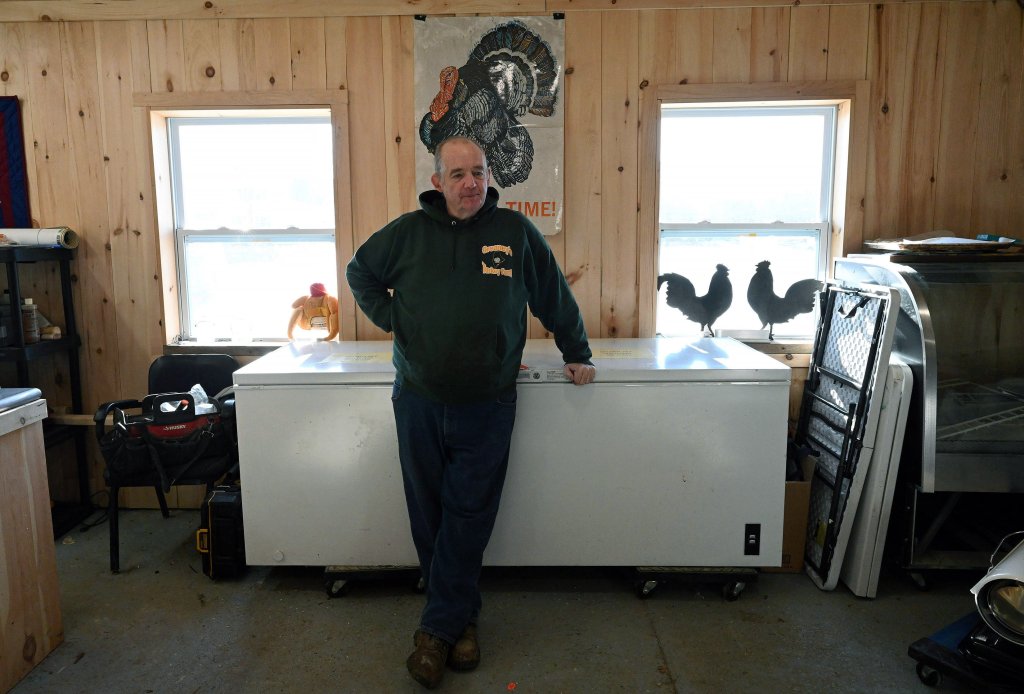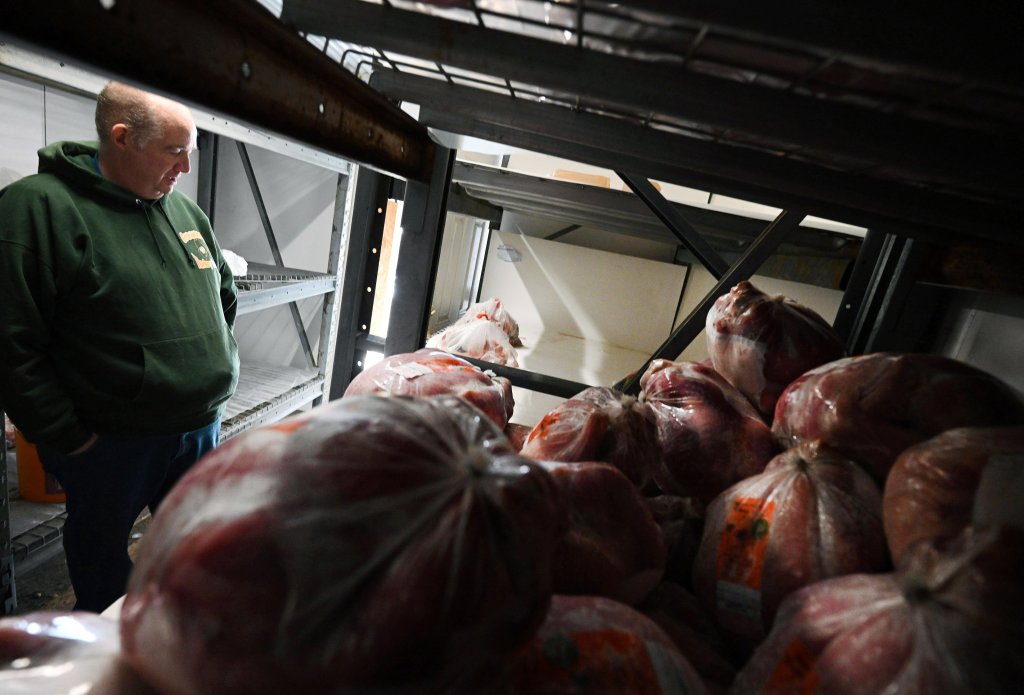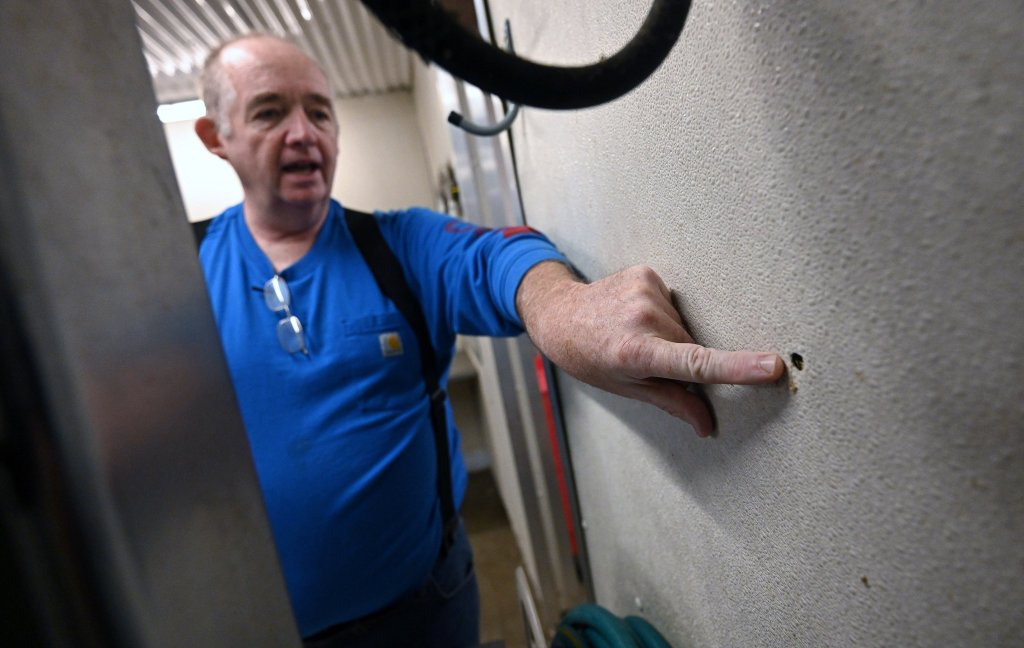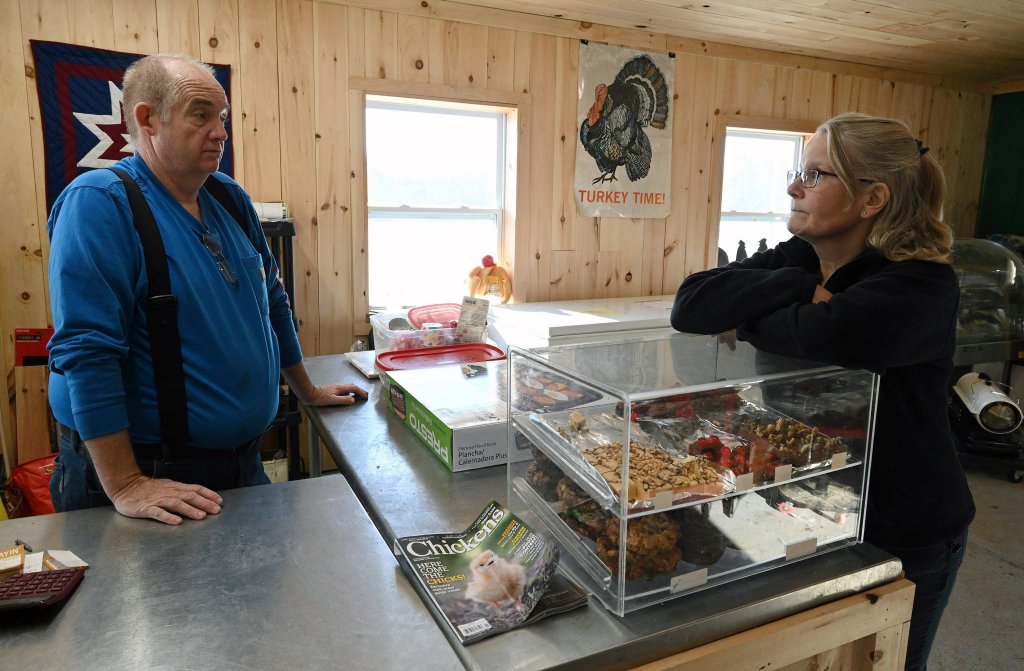MERCER — The turkeys fill up the blast freezer. There are 314 of them, slaughtered in late October with the intention of being sold, seasoned, cooked and savored by hundreds of hungry Maine families on Thanksgiving. Instead, they are stuck in time, destined for a future of frost and subzero temperatures until state inspectors follow through on their notice to destroy them.

Before their stint in cold purgatory, the turkeys were raised on Greaney’s Family Farm in Mercer. Scott Greaney has run the farm for 43 years, raising his own turkeys while also slaughtering and processing poultry for around 1,000 small producers, some of which cross state lines to bring him their birds.
Farmers don’t just come to Greaney’s for the quality of his work. There is a shortage of local meat and poultry processors in the state, and while some farmers raise and slaughter their own birds, Greaney uses his commercial slaughter license to process poultry for backyard growers and farmers that don’t have their own facilities. For 23 years, this arrangement has worked without a hiccup, Greaney said.
“The benefit to us was protecting the integrity of the small cottage industry of poultry, because if one person goes out there and the birds aren’t processed correctly, it can damage everybody else trying to sell birds,” Greaney said. “So that was the selling point. I’m like, ‘Well, we got to protect our business and everything, and we’re helping other farmers out. It’s farmers helping farmers.'”
But now, after a year of going back and forth with the state over labeling, licenses and inspection violations, Greaney is at the risk of losing 314 turkeys, paying a fine of $28,700 and relinquishing the licenses that have historically allowed him to raise and sell his own birds while also processing poultry for other farmers.
The situation casts doubt on whether the Maine Department of Agriculture, Conservation and Forestry has the interests of small producers at heart. Greaney’s is one of the only processors in the state that custom slaughters poultry for small farms and individuals, charging around $5 per chicken and barely turning a profit. Meanwhile, most processors under federal or state inspection charge a higher rate and have a minimum requirement of birds per slaughter.
If he signs, the DACF’s settlement agreement doesn’t just impact Greaney’s business. It touches the family in rural Maine that raises a few chickens in their backyard, the farmer that comes to Mercer from New Hampshire to process turkeys and the vendor that sells birds to the same customers every week at the farmer’s market.

Scott Greaney walks inside his blast freezer Sunday at Greaney’s Turkey Farm in Mercer. The freezer holds 314 turkeys, equal, he said, to 500 pounds of meat, that have been embargoed by state inspectors. Rich Abrahamson/Morning Sentinel
The state’s small farm standards
Greaney’s isn’t the only farm that had poultry products embargoed by Maine DACF over the last year, but he still feels singled out. Greaney said that his farm was targeted by the Maine Meat and Poultry Inspection program.
“This is a personal vendetta,” Greaney said. “They don’t like me.”
Craig Lapine, director of the DACF’s Bureau of Agriculture, said that the state has no vendetta against any farm. In Greaney’s case, he said it came down to problems around continued violations and suspended licensing.
“All I can say is, over 40 years, it is true that food safety standards evolve and it may in fact be true that Greaney’s had no problem meeting the standard in 1985, but the standard may be different now,” Lapine said. “I would contest the idea that we have been moving the ball somehow, or singled him out for a kind of selective prosecution, or I think as he might say, persecution.”
Agricultural establishments in Maine can choose from multiple avenues of inspection. There’s federal inspection through USDA’s Food Safety and Inspection Service, which requires the establishment to have an inspector present every time an animal is slaughtered, ensuring that the process is sanitary and humane. Those under federal inspection can sell in state, across state lines and to other countries, in any quantity and to anyone.
Maine also has a state inspection program through a cooperative agreement with FSIS, which requires the state’s inspection activities to be equal or greater than that of federal inspection activities. State-inspected establishments can only sell in-state, unless they are nominated to be part of the Cooperative Interstate Shipping Program, which allows state-inspected plants to operate as federally-inspected facilities.
But smaller poultry plants in Maine have another option. Plants that process under 20,000 birds per year, like Greaney’s, can be exempt from regular inspection, instead visited annually, as long as their facility meets the sanitary standard and they prove that they are sound in their knowledge of food safety guidelines.
These farms can choose from multiple poultry exemptions. Farms that slaughter and process their own birds can operate under the Grower Producer exemption, and farms that want to slaughter for other people can operate under the Small Enterprise exemption. There’s also the Custom Poultry Processing exemption, allowing establishments to custom process for individuals that don’t intend to sell their products.
With permission from the DACF commissioner, small producers can operate two poultry exemptions in the same calendar year. Greaney said his farm has operated under both the Grower Producer and Custom Poultry Processing exemptions for over 30 years.
Of the 17 farms that processed fewer than 20,000 birds in 2023, Lapine said that only Greaney’s Family Farm fell short of meeting the small farm poultry standard.
“We’ve only had one of those 17 where there’s been an issue, who have found it challenging to meet the standard, and that is the person that we’re talking about,” Lapine said.
First farm to fall
The first sign of trouble for Greaney’s began last November while processing chicken for Ledge Hill Farm in Cornville, owned by longtime friend Gary Merrill. It was a clash with the state that convinced the 70-year-old Merrill to retire, shuttering the farm he had opened just a year before, in 2022.

Scott Greaney of Greaney’s Turkey Farm in Mercer talks Sunday at his farm, which he co-owns with his wife, Tracy. Rich Abrahamson/Morning Sentinel
“This Department of Agriculture debacle that we had just ticked me off so much, I just closed up shop,” Merrill said. “It wasn’t worth what they were doing to me.”
While Merrill didn’t have his own license, he entered into a partnership with Greaney to essentially consolidate into one business under Greaney’s license. The signed legal agreement stated that they would each raise birds on their respective farms but that both farmers would use Greaney’s slaughterhouse, slaughtering the chickens and turkeys on different days to ensure biosecurity, Merrill said.
A year into this process, Ledge Hill Farm’s poultry was embargoed because it was processed under Greaney’s Grower Producer exemption, which did not allow the commercial processing of birds raised on another farm, according to DACF’s administrative settlement agreement. The labels were also considered misbranded, as they were missing contact information for Greaney’s, Lapine said.
“If Gary Merrill wants to put a Ledge Hill sticker and let people know it’s his, that’s fine,” Lapine said. “But for food safety reasons, the primary label has got to say where it was slaughtered, when it was slaughtered, have the food safety information on it, and that really became the issue, is that the stuff that the state cares about had kind of been obscured as the primary label.”
Merrill said he pushed back against the inspectors, questioning the rules that required the state to embargo his birds without giving due notice for the license and labeling issues. When provided with a copy of the farms’ legal agreement, Merrill said that Dr. Jennifer Eberly, a veterinarian and MMPI director, deemed it irrelevant.
Ledge Hill Farm’s poultry, deemed “uninspected,” was embargoed twice during this period, at Emery’s Meat Market in Waterville and Brewer. The state also conducted inspections at Ginny’s Natural Corner in Skowhegan, where Ledge Hill Farm sold eggs, according to the state’s retail food inspection reports.
Greaney was told by the state that he would have to switch to the Small Enterprise exemption for Merrill to continue selling his birds. Even after Merrill’s poultry products were released from embargo, he said that the state wouldn’t let him continue selling chicken unless Greaney bought the birds from him and sold them as his own, assuming liability for any potential problems with the meat.
Most of Merrill’s big accounts had been scared off, and with 4,000 chicken parts still in the freezer, he decided it wasn’t worth continuing business.
“I just said to hell with it,” Merrill said. “I don’t need this in my retirement. I know rogue bureaucrats when I see them; I’ve dealt with them my whole life of business, and it’s a pretty extensive business background. To me, the things they said and the way they said it, it was retribution for the pushback they got from me that day.”
Though Greaney’s switch to the Small Enterprise exemption on Nov. 8, 2023, allowed him to slaughter and process for other farms, it was his first time operating under the exemption and the liability that came with it. He said being forced to change licenses was one contributing factor in the onslaught of embargoes and inspections that came down on him over the next year.
Violations and miscommunications
In December 2023, Eberly noticed that Greaney was advertising smoked turkey on his Facebook page, the sale of which is not allowed under the Small Enterprise exemption, according to inspection reports. Greaney said that the state ordered him to destroy 16 packs of turkey legs and two packs of turkey breasts that had labels from Alewives Brook Farm in Cape Elizabeth and lacked contact information for Greaney’s.
“Oh, my God, they descended in here,” Greaney said. “I thought there was going to be a SWAT team out front, like, ‘You can’t sell smoked turkey!’ I’m like, ‘What do you mean? We’ve sold smoked turkeys every year.'”
In January, more poultry processed by Greaney’s was embargoed at Alewives Brook Farm for the same labeling problem. The nine packs of drumsticks and 16 packs of turkey roast were lifted from embargo eight days later, once new labels had been applied.
Around this time, Greaney was visited by a Food Inspection Program inspector, who found that the farm wasn’t meeting a number of requirements to operate under the Small Enterprise exemption. The inspection report noted things like exposed wood, gaps that keep doors from closing tight, condensation buildup and the need for a new sink.
These visits continued into the spring, which is the offseason. Greaney said that the farm wasn’t open when inspectors came May 30, stating that the problems from last year hadn’t been resolved.
“They come into the plant processing plant, and they’re like, ‘We’re here to check on the progress of repairs that you need done,'” Greaney said. “I said, ‘Well, we just opened today, and we’re literally moving the storage stuff out of the slaughterhouse.’ We don’t come over in the wintertime — it’s too cold to work.”
The inspectors documented a rodent infestation; Greaney said it was one dead mouse, which meant his traps were working. The inspectors documented holes in the walls; Greaney said they were rivet holes, which he always replaces. The inspectors documented a large hole in the ceiling; Greaney said it was an access panel for his carpenter, who was working upstairs.
Each violation was fixable, but not urgent, Greaney said, as facilities like his blast freezer, which was written up for wood shelving, wouldn’t be used until November.
“They’ll say, ‘We want this done by this date,'” Greaney said. “And I’m like, ‘We’re going to get to it as soon as I get my people to get it done.’ At this point, we didn’t realize that they were tallying up.”

Scott Greaney of Greaney’s Turkey Farm on Sunday points out a hole in the wall in the farm’s gutting and chilling room that he said was cited by inspectors in a violation. Rich Abrahamson/Morning Sentinel
Steve Sinisi, who owns Old Crow Ranch in Durham, said that it’s not easy to get the funds to fix facilities each year. Banks rarely give loans to agricultural establishments because they’re thought to be too high risk, and he said that state inspectors can’t expect changes to happen overnight.
“There has to be some time frame,” Sinisi said. “It can’t be, ‘Well, when I come next week, that better not be there.’ It’s like looking at them and going, ‘Hey, I’m taking your car. You got three days to replace it.’ They wouldn’t know what to do, either.”
The state sent a letter of warning to Greaney in June, placing the renewal of his retail food establishment and commercial processing licenses on hold. Many of the violations had been flagged in inspections the December before, the letter said, and had not been corrected.
Greaney said that he and his wife never received this letter, which wasn’t registered, and were unaware that their licenses were on hold. If they had known, he said, they would’ve acted immediately.
On Oct. 18, FIP inspector Tom Cox returned to the farm and determined that the requirements for the Small Enterprise or Grower Producer exemptions still had not been met. On the bottom of his report, Cox wrote, “**You must maintain the physical facilities to the highest standard in order to keep your Grower Producer exemption. NO EXCEPTIONS!”
On Oct. 19, Greaney processed hundreds of turkeys. On Oct. 22, MMPI and FIP inspectors came to the Mercer farm, detaining 314 turkeys and embargoing 60 chickens, worth around $25,000.
When the inspectors notified him of the embargo, Greaney pointed to the wording on the Oct. 18 inspection report, citing the words “maintain” and “keep” as evidence of his current license. He said the inspectors told him it must be a mistake.
Lapine said that the wording on the report could have been more clear.
“I wish we hadn’t said ‘keep,'” Lapine said. “Because the reality is, he wasn’t licensed at that moment, and that implies that maybe he is, so I wish we hadn’t said ‘keep.'”
A week after the state embargoed the birds, Lapine said Greaney was able to meet the standard and was issued a temporary 90-day license on Oct. 30.
“I think it’s fair to say that this was in reach all along,” Lapine said. “It is a sad thing for everybody, and really unfortunate that he went ahead and processed those birds before his facility did meet the standard, because we can’t turn back the clock and do something magical with those birds and say that they were processed under sanitary conditions when we know they weren’t.”
What comes next?
The state served Greaney with a nine-page settlement agreement and $28,700 civil penalty that would resolve his violations, so long as he agrees to certain conditions.
Greaney already paid $2,870 of the penalty, with the remaining $25,830 suspended as long as he agrees to undergo poultry processing training, operate no more than one poultry exemption for a period of at least five years, destroy all poultry slaughtered without inspection, interact professionally with DACF staff, resolve facility repairs and commit no violations for the next five years, among other things.
Greaney said he has not signed the agreement.
Under the conditions, Greaney would have to choose between the Grower Producer, Custom Poultry Processing or Small Enterprise exemption. He said that the Small Enterprise isn’t an option, because it requires the processor to buy the meat and sell it back to the producer, assuming more liability than his insurance allows. That leaves the first two exemptions.
“We have to make a decision,” Greaney said. “Are we just going to take care of ourselves, or are we going to take care of the people that have been here for 30-40 years?”
After Greaney’s appeal to the settlement agreement in early November, he said that the department said it would respond at their earliest convenience in the next 30 days. The timeline made it impossible to do anything with the birds until after Thanksgiving, Greaney said.
Every day that the turkeys sit in the walk-in blast freezer costs the farm between $60 and $75 in operating costs, Greaney said.
“They’re playing this out as hard as they can, so we can’t sell those birds,” Greaney said. “We have to keep them frozen. We cannot touch them under penalty of fines and jail.”

Scott Greaney and wife Tracy, co-owners of Greaney’s Turkey Farms in Mercer, are seen Sunday in the farm store. Rich Abrahamson/Morning Sentinel
Greaney suggested donating the embargoed meat, but Lapine said that uninspected poultry isn’t safe for anyone.
“The food safety standards are about protecting human health, and that is the health of people who can afford the food, and the health of people who perhaps are receiving the food through the charitable or emergency food system— we don’t distinguish,” Lapine said. “And if it’s not safe for human consumption, it’s not safe for poor people, either.”
One condition of the settlement agreement is that Greaney’s “must interact congenially and professionally with DACF staff and not engage in abusive verbal or nonverbal communications or other intimidation tactics so as not to obstruct DACF from completing their work.”
Kathy Shaw, a farmer and former Democratic state representative whose term ended Dec. 4, said that this condition doesn’t leave any room for dialogue.
“He needs to be quiet when the inspectors come?” Shaw said. “And he needs to play by their rules, without questions? I don’t think that is the right way to go about it.”
Shaw has had her own share of experience with state inspectors. She used to own 4 Season Farm Market, a food store in Auburn, which closed before the pandemic. One day, she said, inspectors came by announced, asking her to pull her meat out of the freezer so they could destroy it, and Shaw pushed back, taking the meat home to her family. The only problem with the products was that they were missing the state seal.
This fall, Shaw was planning to purchase some of Greaney’s turkeys to supplement her stock. When he notified her of the state’s embargo, she started advocating for Greaney, using her role as a representative to call state commissioners and other sources. None of the commissioners she spoke to said they could help Greaney’s situation.
In her many conversations with Greaney, Shaw said that his story never varies.
“It is that he’s trying to do his best,” Shaw said. “He’s trying to figure out all these new rules that they’re coming up with, and he feels like he is, according to the documentation that I’ve read, pretty much being played as the evildoer, when, in reality, no small Maine producer wants to willingly take the risk to offer people bad food.”
Shaw said that the DACF’s meat inspectors have a difficult job, often leading to hostility.
“They are almost never welcomed into any place that they go,” Shaw said. “They go in, I think, with a jaded sort of: ‘OK, here we go again. We’re going to give them as much hell as they give us.’ So it sets up hostile environment right from the very beginning, and honestly, 10 or 15 years ago, it was not like that. We had different inspectors who would work with the farmer to try and find the best solution.”
Sinisi said that the direction of the department shifted after the retirement of Dr. Henrietta Beaufait as MMPI director.
“After Henrietta retired, it really did turn into almost like a policing agency,” Sinisi said. “I had someone show up at my farm looking for my red meat plant, and I’m like, ‘I’m sorry, who sent you here? We are not licensed for that, we are licensed for wholesale.’ So it just started feeling like they were creeping around looking for things.”
Up until this past year, Greaney said he had maintained a positive relationship with the department in his decades of farming. Lapine noted that Greaney has looked to the state for guidance regarding poultry regulation and has maintained a supportive relationship with DACF staff since 2017.
The state’s crackdown on Greaney’s Family Farm is just one piece of a larger debate happening in slaughterhouses around the state: Is custom processing worth it? Maine DACF has offered grants to bring processors under state inspection, but some establishments have already switched to USDA inspection to take advantage of the decreased regulations around what, where and to who they can sell.

Scott Greaney mixes dough for cinnamon bread Sunday while working in the farm store at Greaney’s Turkey Farm in Mercer. Rich Abrahamson/Morning Sentinel
Either way, processing costs rise, consolidation looms and small producers lose out.
Sinisi said that his farm had to switch to a USDA processing plant because the few small processors in the state were completely overbooked and couldn’t handle the amount of meat he brought in. He said that if Greaney’s has to stop processing, the Maine food supply chain will have lost a key middle man.
“That’s what’s frustrating to hear this about Greaney’s, is that there are only a few places that even do turkeys anymore,” Sinisi said.
Shaw said that the state’s treatment of Greaney should be taken as a warning to other farmers.
“They’ve taken a farmer who has a longstanding, excellent reputation, and now they’re really trying to, at least from what I can see, make him an example of what’s going to happen if you don’t play by our rules,” Shaw said.
In January, the annual Agricultural Trade Show is taking place on the second Tuesday, Wednesday and Thursday of the year at the Augusta Civic Center. Lapine said that inspection staff will be present at the listening post, an open forum for having dialogue.
Lapine said the DACF wants to hear feedback and support small producers.
“No one wants Greaney’s Family Farm to succeed more than the department,” Lapine said.
Send questions/comments to the editors.











We invite you to add your comments. We encourage a thoughtful exchange of ideas and information on this website. By joining the conversation, you are agreeing to our commenting policy and terms of use. More information is found on our FAQs. You can modify your screen name here.
Comments are managed by our staff during regular business hours Monday through Friday as well as limited hours on Saturday and Sunday. Comments held for moderation outside of those hours may take longer to approve.
Join the Conversation
Please sign into your Sun Journal account to participate in conversations below. If you do not have an account, you can register or subscribe. Questions? Please see our FAQs.